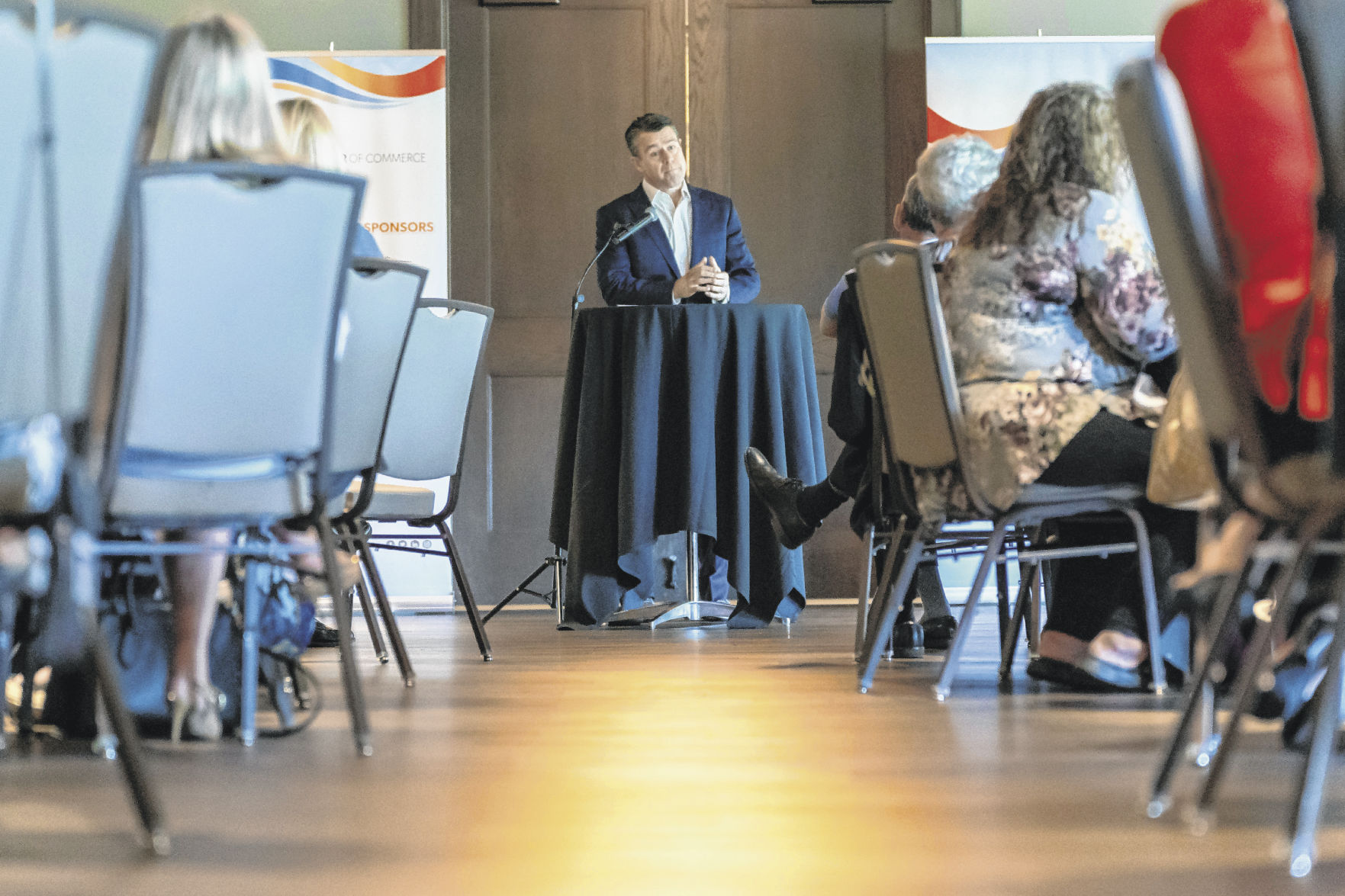Infrastructure and fiscal responsibility were on the menu for Sen. Todd Young’s (R-Indiana) keynote address Thursday at a Franklin Chamber of Commerce luncheon.
Young spoke about the recently passed $1 trillion bipartisan infrastructure plan, his reservations about the “human infrastructure” part of the bill, and took questions from the audience.
He was initially part of a group of 21 Republicans who were working with Senate Democrats on the infrastructure bill. But, due to last-minute changes he disagreed with, was one of three in the group to vote no.
Both Young and Sen. Mike Braun (R-Indiana) voted against the bill, which passed with the support of 19 Republicans and all 50 Democrats. The bill provides funding to rebuild roads and bridges, modernize public works systems and boost broadband internet, among other improvements to the nation’s infrastructure.
Young disagreed with last-minute additions including the creation of a Civilian Climate Corps, rebates for electric vehicles and an infrastructure equity provision.
“Frankly, that injected social policy into infrastructure — something we have never done before,” he said. “That was done without debate and was put into the package late, and didn’t reflect the values and desires of the vast majority of my constituents.”
Young criticized the inclusion of climate change measures, and said the bill is more beneficial to blue states than red states such as Indiana.
“We don’t need to be wasting Hoosiers’ money on things that are not infrastructure. And we certainly don’t need to be spending many millions more dollars on things like mass transit that are barely even used by Hoosiers, but instead benefit places like New York and California,” he said.
The Congressional Budget Office estimates the bill will decrease direct spending by $110 billion, increase revenues by $50 billion and increase discretionary spending by $415 billion. On net, the legislation would add $256 billion to projected deficits over that period.
The five-year spending package would be paid for by tapping $210 billion in unspent coronavirus relief aid and $53 billion in unemployment insurance aid some states have halted, along with an array of other smaller pots of money, like petroleum reserve sales and spectrum auctions for 5G services.
The bill that passed is well short of the $2.25 trillion proposal that President Joe Biden had introduced in March. However, there is still some possibility that the “human infrastructure” portion of the proposal that would provide $3.5 trillion for new family, health and education programs could be passed. It is next up for consideration.
Young is concerned about the “human infrastructure” portion because, “it is a grab bag of Democratic far-left priorities,” he said. Still, he agrees some of the priorities Biden has highlighted are legitimate and do need to be addressed, such as affordable housing and child care costs, he said.
“There are issues in there that are legitimate that have to be dealt with through a formal bipartisan process,” he said.
Young favors measures that would get more child care providers certified to increase supply and lower costs, as well as measures that would encourage cities and towns to relax regulations to allow for more affordable housing to be built in their communities, he said.
An audience member asked Young for his opinion on the portion of the “human infrastructure” portion that would pay for Americans to attend two years of community college for free.
He wasn’t clear on the status of that part of the bill. He said Democrats are not working with Republicans on the bill, which is expected to pass along party lines.
“What we should be talking about is creative ways to finance college. You go to college so you can make more. So we ought to be talking about programs of study out there that are sold as real, professional opportunities to upgrade your skills,” he said.
Young would like to see federal programs such as Pell Grants applied to a wider variety of higher education programming, such as coding boot camps. Employers should also be encouraged to pay for education opportunities for their employees to increase their skills, he said.
“We aren’t a free stuff country, and I don’t wanna be a free stuff country.” he said.
Young also spoke about recent spending bills which have numbered countless trillions since the coronavirus pandemic started last year.
Spending to get out of the pandemic was necessary to save businesses and help people who couldn’t work due to business closures, but he has called for spending to be reined in going forward.
“We are in a period of unprecedented fiscal irresponsibility in this country. I know Hoosiers are concerned. I’m concerned, too,” he said. “If you take nothing else away from here, know … that I’ll do my part and more than my 1/100th as a U.S. Senator to get our spending under control.”
Young expressed concerns about inflation and warned it could become a “hidden tax on Americans” that could impact everyone.
“This is intended to be a somewhat sobering message that I’m delivering to all of you,” he said.
The focus, instead, should be on job training, innovation and upskilling workers to stay ahead of China, he said.





